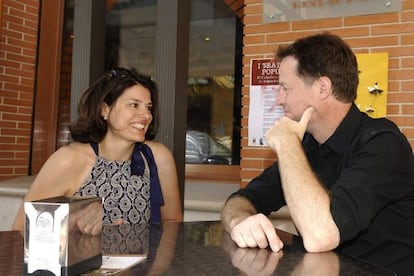Foreign vacationers make up for fall in domestic demand
Experts in the sector expect August hotel occupation to reach 80 percent


Spain’s tourism sector has just passed the halfway point of its high season, and so far the story is one of foreign visitors, whose numbers have risen, but fewer Spanish holidaymakers, who are cutting down their spending on vacations given the uncertainty over Spain’s economy. Up until June, the arrival of international tourists rose 4.7 percent, while their spending went up by 5.7 percent, thanks mostly to visitors from the United Kingdom, Germany and the Nordic countries.
The month of July was worrying for hoteliers, as the president of the Spanish Confederation of Hotels and Tourist Accommodation (CEHAT), Juan Molas, explains. Inland areas, Galicia, Asturias and the provincial capitals saw occupancy fall 30 to 40 percent. “But in the early part of August that has improved in the areas that were worst affected,” he says. “And despite the fact that hotels have not been full on our coasts, the occupancy levels are at an average of 75 percent, thanks to the strong performance of the archipelagos, Levante, Catalonia and the Costa del Sol, where the foreign presence is greater. The remaining 25 percent corresponds to the fall in demand among domestic tourists, according to the sales director of Meliá Hotels International, José María Dalmau.
The high season started late this year, and bookings have been mostly last-minute, explains Molas. “This week we are selling the following week,” says Dalmau. “We had never seen this in the month of August. In fact, it’s the first time that we’ve done an advertising campaign at this stage of the season, when we still have 30 percent of the inventory to sell.”
Meliá has opted for the last-minute offers that the sector hopes will save the summer. In spite of that, Dalmau is hoping that foreign tourists can compensate for the national volume that has been lost and leave the sector on a par with last year’s performance, or in the worst-case scenario down by five percent on 2011. Both of the experts point out the rise in Russian visitors — of over 40 percent — and of those from Eastern Europe.
“Millions of tourists can’t be wrong”
Always take your vacations in Spain. That’s what the minister of industry and tourism, José Manuel Soria, says will overcome the fall in domestic demand in the sector.
“A lot of Spaniards leave the country looking for sun and sand, and what they find are mosquitoes, temperatures that exceed 35 or 40ºC, and a water temperature that is unlike what you’ll find in Spain,” the minister told news agency Europa Press.
“The 57 million tourists who come to Spain each year can’t be wrong,” he continued. “Perhaps it is us who are wrong, given that a lot of the time, instead of visiting places within Spain we head for remote corners of the world.”
Soria said he was satisfied with the figures for international visitors. The figures for the first half of the year show five-percent growth and a 5.6-percent increase in spending, which led the minister to say that 2012 would be “a good year.”
The current summer season marks the first in four years of economic crisis to see a significant fall in summer bookings for domestic holidaymakers.
“We are coming off the back of a historic year for the sector, 2011, when the Arab Spring helped us a lot. And in 2012, the arrivals from abroad are leveling out the lack of Spanish visitors,” says the president of the Spanish Confederation of Travel Agents (CEAV), Rafael Gallego. “To continue to grow in this context is still good news.”
Gallego predicts that the occupancy rates on the Mediterranean coast will be over 80 percent in the month of August.
But no one can deny that spending on vacations is changing given the poor economic outlook and high levels of employment — and not just in Spain. Tourists are motivated by price, they are opting for shorter stays, and they prefer vacation offers with everything included in the final price, which is why demand for cruises, for example, has risen between 13 and 15 percent this summer, according to the president of CEAV.
In his opinion, the sector is making great efforts to bring down prices in order to maintain levels of demand, despite the damage that is doing to margins. “Prices are currently at levels seen in 2007,” says the CEHAT president. “We are currently seeing prices at levels of 2007,” he says. “So far this year, the places that depend on domestic demand have dropped four or five percent, while those places that cater for foreign tourists have raised prices around 1.5 percent.”
And in September, costs will rise further. The imminent value-added tax hike from eight percent to 10 percent is seen by hoteliers as bad news for a sector such as tourism, which is highly sensitive to price. What’s more, destinations such as North Africa, and in particular Tunisia, are recovering, with a 30-percent increase in bookings compared to last year.
Tu suscripción se está usando en otro dispositivo
¿Quieres añadir otro usuario a tu suscripción?
Si continúas leyendo en este dispositivo, no se podrá leer en el otro.
FlechaTu suscripción se está usando en otro dispositivo y solo puedes acceder a EL PAÍS desde un dispositivo a la vez.
Si quieres compartir tu cuenta, cambia tu suscripción a la modalidad Premium, así podrás añadir otro usuario. Cada uno accederá con su propia cuenta de email, lo que os permitirá personalizar vuestra experiencia en EL PAÍS.
¿Tienes una suscripción de empresa? Accede aquí para contratar más cuentas.
En el caso de no saber quién está usando tu cuenta, te recomendamos cambiar tu contraseña aquí.
Si decides continuar compartiendo tu cuenta, este mensaje se mostrará en tu dispositivo y en el de la otra persona que está usando tu cuenta de forma indefinida, afectando a tu experiencia de lectura. Puedes consultar aquí los términos y condiciones de la suscripción digital.








































